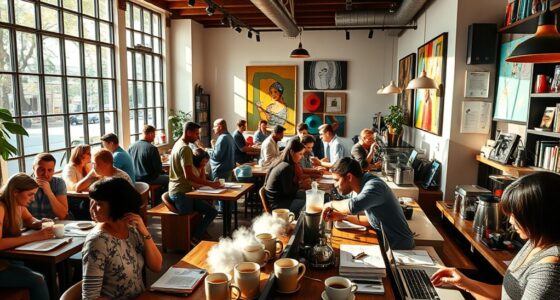Coffee’s rise in the Middle East blends rich cultural heritage with modern trends. It’s more than a drink; it’s about community and hospitality. You’ll find a mix of traditional brewing methods and trendy coffee shops, especially in places like Dubai and Saudi Arabia. Specialty coffee is gaining traction among younger consumers, driven by social media’s influence and eco-conscious practices. There’s much more to discover about this evolving market and its exciting future ahead.
Key Takeaways
- Coffee culture in the Middle East dates back to the 14th century, intertwining with hospitality traditions and community rituals.
- The UAE leads the rise of coffee shops, with over 4,000 in Dubai alone, reflecting growing demand for specialty coffee experiences.
- Social media significantly influences coffee trends, promoting visually appealing content and fostering community among coffee enthusiasts.
- Eco-friendly initiatives are gaining traction, as brands focus on sustainable practices and ethical sourcing to appeal to conscious consumers.
- The MENA coffee market is projected to grow rapidly, driven by premiumization and a shift towards specialty coffee consumption.
Historical Context of Coffee in the Middle East
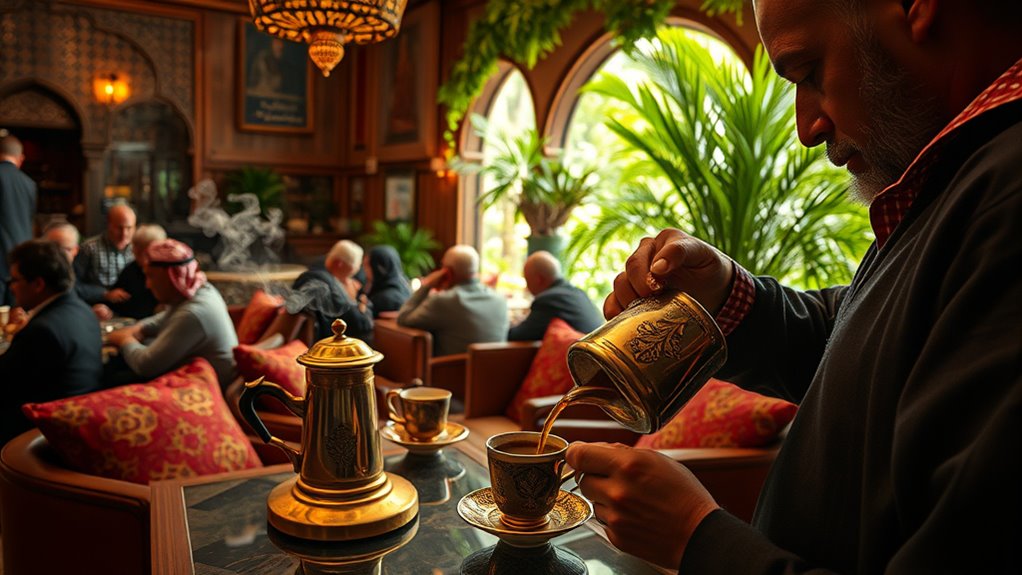
Since its origins in the 14th century, coffee has brewed a rich history in the Middle East, establishing itself as the birthplace of modern coffee culture.
The Arabic word “qahwa” reflects how deeply intertwined Arabic coffee is with hospitality traditions. You’ll find that traditional coffee preparation, especially Bedouin coffee brewing, remains popular, showcasing its cultural significance during social gatherings.
The essence of Arabic coffee lies in its hospitality, where traditional brewing rituals celebrate community and connection.
Coffee ceremonies and rituals play a crucial role, emphasizing community and the warm act of serving coffee alongside dates.
As coffee spread from Ethiopia to the Middle East, it transformed into a social catalyst, leading to the creation of coffeehouses. These establishments became hubs for social interaction and political discourse, further enriching the region’s coffee culture.
The Evolution of Coffee Consumption
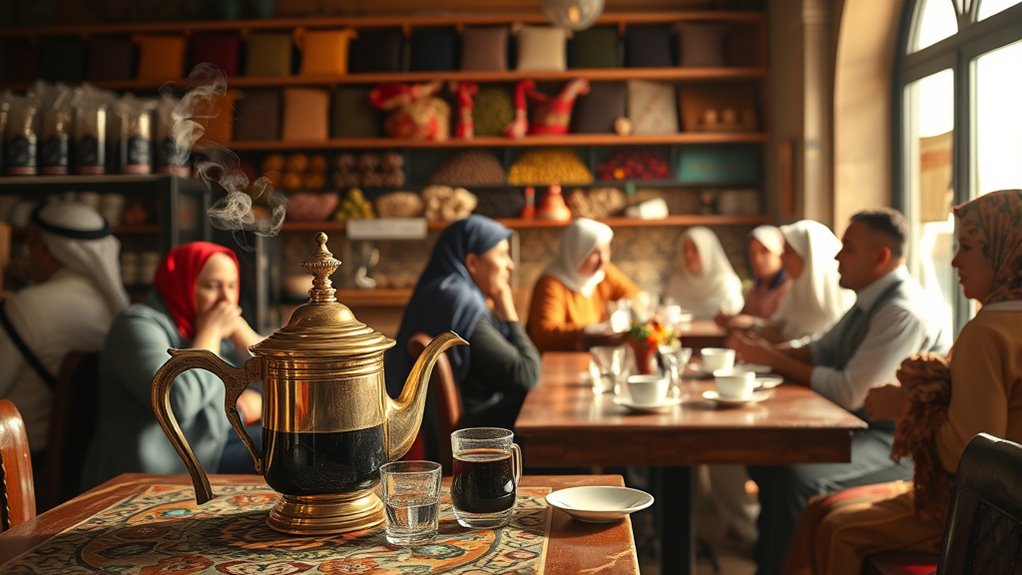
As coffee culture in the Middle East continues to flourish, traditional methods blend seamlessly with modern trends, creating a dynamic landscape for coffee consumption.
You’ll notice that coffee in the region has evolved greatly since the 14th century. Here are some key points to reflect upon:
- Traditional Arabic brewing methods coexist with modern styles like espresso and cold brew.
- The UAE is a central hub, with over 4,000 coffee shops and growing numbers in Dubai.
- Younger generations are drawn to specialty coffee experiences, emphasizing quality and unique offerings.
- The MENA branded coffee shop market is expanding, expected to exceed 12,160 outlets by November 2025, reflecting robust demand for diverse coffee experiences.
This evolution showcases a rich tapestry of flavors and influences in coffee consumption across the Middle East.
Specialty Coffee Shops and Their Impact
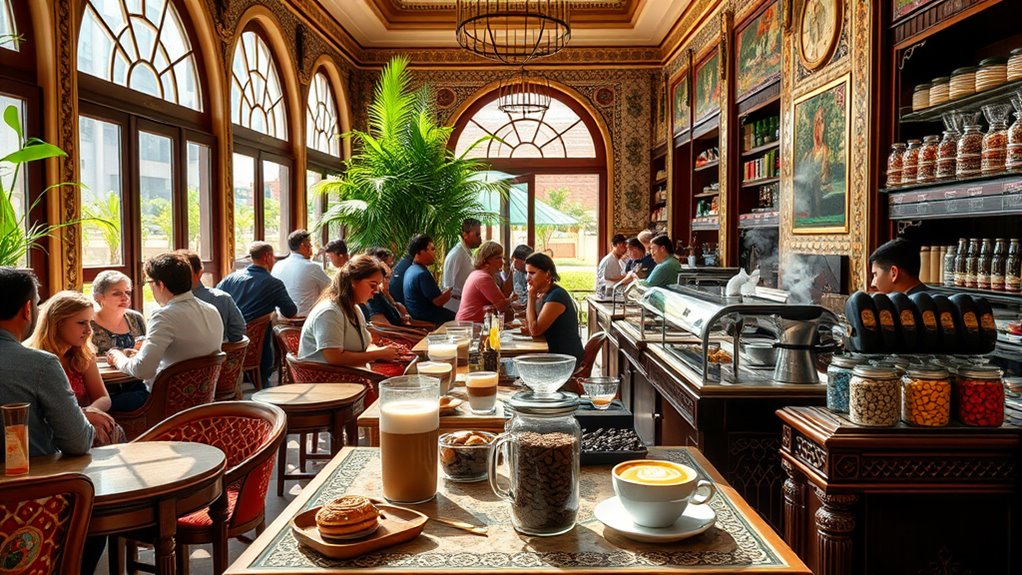
While the coffee scene in the Middle East evolves, specialty coffee shops are making a significant impact on consumer preferences and the overall market. With over 80% of industry leaders in Saudi Arabia and the UAE emphasizing the importance of quality coffee, specialty coffee demand is skyrocketing. The MENA branded coffee shop market grew by 11%, now boasting over 11,163 outlets, driven largely by specialty brands like Bacha Coffee and Café Kitsuné. Nearly three-quarters of consumers see specialty coffee as essential in quality coffee shops. By November 2025, the market is set to exceed 12,160 outlets, showcasing the powerful influence of specialty coffee.
| Specialty Coffee Trends | Impact on Coffee Market |
|---|---|
| Rising consumer demand | Increased outlet growth |
| New brands entering | Premium experiences |
| Artisanal brews favored | Quality over quantity |
| Regional expansion | Enhanced competition |
| Focus on sustainability | Diverse offerings |
Key Trends Shaping the Coffee Market
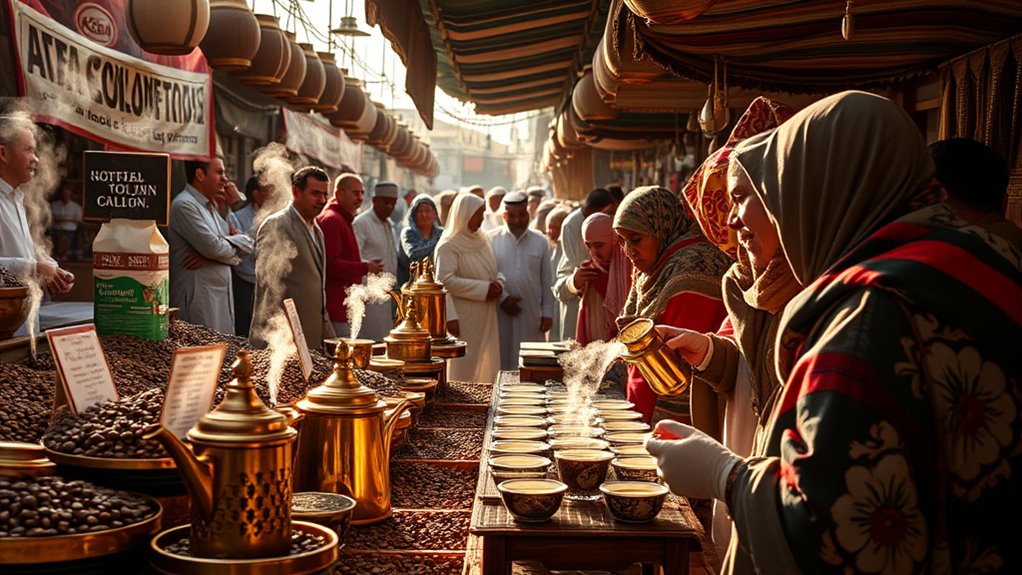
You’ll notice that specialty coffee is gaining traction in the Middle East, with consumers enthusiastic for unique blends and artisan brews. Social media plays a huge role in this trend, showcasing the vibrant coffee culture and influencing your choices. As coffee enthusiasts share their experiences online, the demand for quality and creativity continues to grow. Additionally, global coffee culture is influencing local preferences, as consumers become more aware of diverse brewing methods and flavors. This shift is leading to an increased interest in caffeine content and how different brewing methods affect the overall coffee experience.
Specialty Coffee Popularity
With a growing recognition of specialty coffee‘s value, consumers in the Middle East are increasingly gravitating towards premium coffee experiences. This shift reflects a deepening appreciation for high-quality coffee, shaping the coffee industry in exciting ways.
Here are four key trends driving specialty coffee popularity in the region:
- Consumer Demand: Nearly 75% of coffee lovers see specialty coffee as essential for enjoyable coffee shop visits.
- Market Growth: The MENA branded coffee shop market experienced an 11% increase in the past year.
- Emerging Brands: Chains like Koffee Kulture and Roasters Specialty Coffee are rising in prominence.
- Expansion: Major players like Bacha Coffee and Café Kitsuné are entering new markets, reflecting ongoing interest in premium offerings.
This momentum is set to continue as more outlets open by 2025. Additionally, the rise of sustainable fashion in the coffee industry is encouraging brands to adopt eco-friendly practices in their sourcing and packaging.
Social Media Influence
As specialty coffee continues to gain traction in the Middle East, social media plays a significant role in shaping consumer preferences and market trends.
You’ll notice how influencers showcase trendy cafes and unique brewing methods, making coffee more appealing to the younger generation. These platforms drive creativity and exploration within coffee culture, with brands sharing visually stunning content that highlights the coffee experience.
Eco-friendly packaging and farm-to-cup initiatives gain traction online, reflecting your growing awareness of sustainability. The trend of sharing unique coffee experiences encourages you to seek artisanal flavors, enhancing your appreciation for specialty coffee.
Ultimately, social media’s influence is reshaping the coffee market, connecting brands with consumers who resonate with their lifestyle aspirations.
The Role of Social Media in Coffee Culture
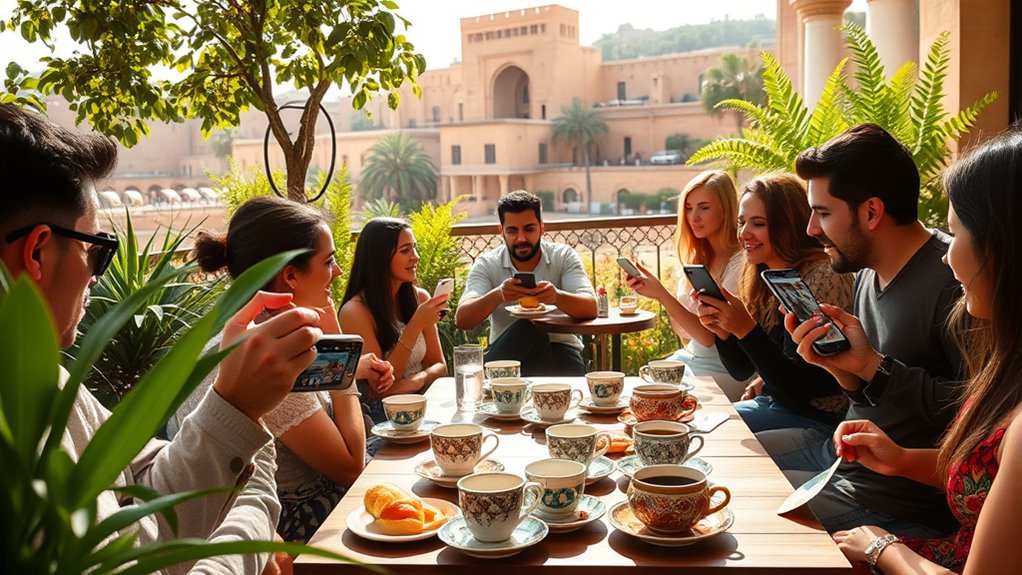
Social media’s impact on coffee culture is impossible to ignore.
You see visually stunning content that sparks creativity and drives engagement, shaping trends and preferences.
Plus, brands use these platforms to showcase eco-friendly practices, connecting with a growing audience that values sustainability in their coffee choices.
Visual Storytelling and Engagement
While you’re scrolling through your feed, it’s impossible to miss the vibrant world of coffee that unfolds on platforms like Instagram and TikTok.
Social media’s visual storytelling shapes coffee culture, driving engagement and sparking interest among consumers. Here are four ways it does this:
- Showcasing aesthetics: Stunning coffee presentations and unique café atmospheres attract attention.
- Highlighting brewing techniques: Creative recipes and innovative methods engage viewers and inspire them to try new things.
- Promoting sustainability: Eco-friendly packaging and sourcing practices resonate with ethically-minded consumers.
- User-generated content: Coffee shops share customer experiences, enhancing brand visibility and fostering community.
Through these elements, social media connects coffee enthusiasts and cultivates a thriving coffee culture in the Middle East.
Influencer Impact on Trends
With the rise of social media, influencers have become pivotal in shaping coffee trends across the Middle East. As a coffee lover, you’ve likely noticed how these influencers spotlight trendy cafes and unique brewing methods, creating buzz around specialty coffee experiences.
Their visually appealing content drives engagement and captures the attention of younger audiences, making coffee chains enthusiastic to collaborate. Through their posts, they not only promote individual brands but also foster a vibrant coffee culture community, encouraging exploration and creativity among enthusiasts like you.
Social media marketing strategies have considerably contributed to the boom in coffee consumption trends, with many recognizing specialty coffee as a must-have feature for quality coffee shops.
Eco-Friendly Initiatives Promotion
As coffee culture flourishes in the Middle East, eco-friendly initiatives are taking center stage, thanks in large part to social media’s reach.
You can easily engage with the growing movement toward sustainability in coffee production by exploring these ideas:
- Follow Eco-Friendly Brands: Discover companies showcasing their farm-to-cup programs and eco-friendly packaging.
- Join Conversations: Engage with influencers and enthusiasts discussing sustainable coffee practices.
- Share Your Knowledge: Post about composting coffee grounds and ethical sourcing to raise awareness.
- Support Visual Campaigns: Participate in Instagram campaigns that highlight environmentally responsible coffee options.
Additionally, consider incorporating natural materials into your coffee setup, as this aligns with the values of sustainability and can enhance your overall experience.
Consumer Preferences and Emerging Coffee Styles
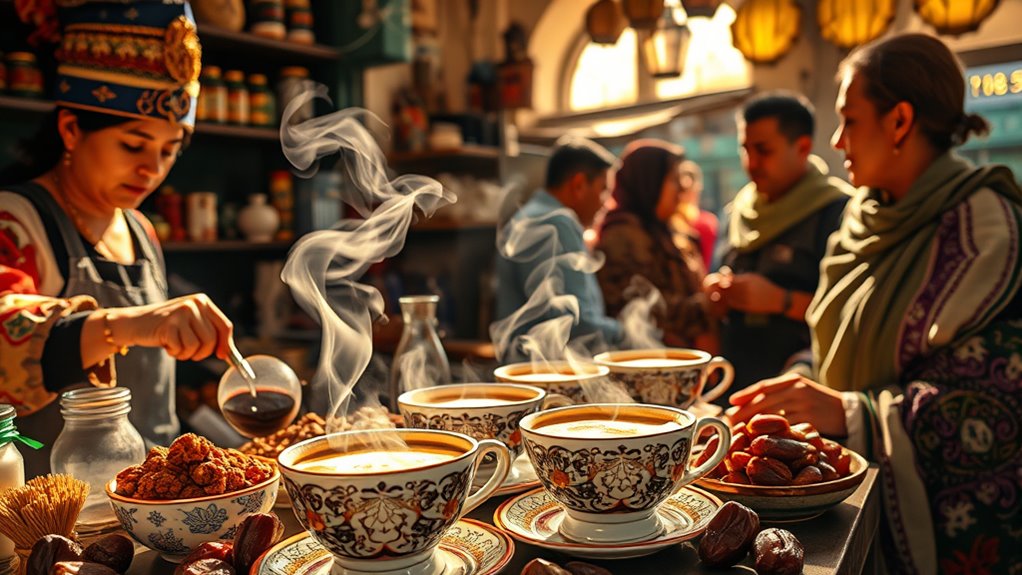
Consumer preferences in the Middle East are rapidly evolving, driven by a growing appreciation for specialty coffee and diverse brewing styles.
You’ll notice that over 80% of industry leaders in Saudi Arabia and the UAE recognize the importance of quality coffee shops. With an 11% increase in branded coffee outlets in the MENA region, the market is booming, reaching 11,163 locations.
Younger generations, particularly Millennials and Gen Z, are pushing for new coffee experiences, like Vietnamese and Indonesian kopi, reflecting a broader interest in global coffee culture.
Specialty coffee brands, such as Bacha Coffee and Café Kitsuné, are expanding into emerging markets, catering to the rising demand for premium coffee experiences among consumers seeking higher-quality offerings.
Economic Impact of the Coffee Industry

Although the coffee industry in the Middle East may seem like a niche market, its economic impact is substantial and far-reaching. Here’s how the coffee sector influences the economy:
- Market Size: The region generates 4.5 to 5 million bags of coffee, with Saudi Arabia leading the MENA market.
- Employment: Many communities depend on coffee production, providing jobs and supporting local economies.
- Growth of Outlets: Saudi Arabia boasts over 5,130 coffee shops, representing 46% of the MENA total, enhancing consumer choices.
- Consumer Preferences: Nearly 75% of consumers prioritize specialty coffee, driving demand and shaping market dynamics.
With these factors, you can see how coffee plays a vital role in both economic development and cultural trends in the Middle East.
Future Outlook for Coffee in the Middle East

The coffee industry in the Middle East is poised for significant growth in the coming years, building on its already substantial economic impact. With a future outlook focusing on premiumization, coffee drinking is becoming a lifestyle choice, driving demand for branded coffee chains.
| Region | Outlet Growth Projections | CAGR (Next 5 Years) |
|---|---|---|
| Saudi Arabia | Leading in outlet growth | N/A |
| Morocco | Fastest-growing market | 19.2% |
| MENA | 12,160+ outlets by 2025 | 8.1% |
Despite challenges, 76% of industry leaders reported positive growth, underscoring resilience and the potential for expansion across the region’s coffee landscape.
Frequently Asked Questions
When Did Coffee Become Popular in the Middle East?
Coffee became popular in the Middle East around the 14th century. You’ll find that its rise was closely tied to trade, which spread the beverage across the region.
By the 16th century, coffee houses emerged as essential social venues in cities like Istanbul and Cairo.
As you explore further, you’ll notice that by the 17th century, coffee had woven itself into daily life, becoming a staple at gatherings and ceremonies.
Why Do Arabs Love Coffee so Much?
You’ll find that Arabs love coffee for its rich cultural significance and social role. It’s not just a drink; it’s a symbol of hospitality and generosity.
When you serve coffee to guests, you’re expressing warmth and respect. The rituals surrounding coffee preparation and consumption create a unique bonding experience, fostering connections during gatherings.
Plus, the diverse flavors and brewing techniques make each cup an adventure, enhancing the appreciation for this beloved beverage.
What Is Coffee Culture in the Middle East?
Coffee culture in the Middle East is rich and diverse. You’ll find various brewing techniques, like Arabic coffee with cardamom and Turkish coffee made in a cezve.
When you visit coffee houses, known as maqhas, you’ll see them buzzing with social interactions, discussions, and laughter.
Coffee isn’t just a drink; it’s a symbol of hospitality and community. Whether you’re enjoying traditional or specialty brews, the experience fosters connections and celebrates cultural identity.
Does the Middle East Grow Coffee?
Think of the Middle East as a budding garden, slowly awakening to the art of coffee cultivation.
While it’s historically known for its coffee heritage, the region’s local coffee production is still in its infancy. You’ll find some countries, like Yemen, with rich coffee traditions, but most coffee beans are imported.
However, as investment grows, the region’s coffee landscape is evolving, and soon, you’ll see more homegrown varieties flourishing.
Conclusion
As you sip your next cup of coffee, remember that it’s more than just a drink; it’s a vibrant tapestry woven into the fabric of Middle Eastern culture. The rise of coffee here isn’t just about caffeine—it’s about connection, community, and creativity. With specialty shops flourishing and social media fueling trends, the coffee scene is brewing a bright future. So, embrace this aromatic journey and let every sip take you deeper into the heart of the Middle East.



